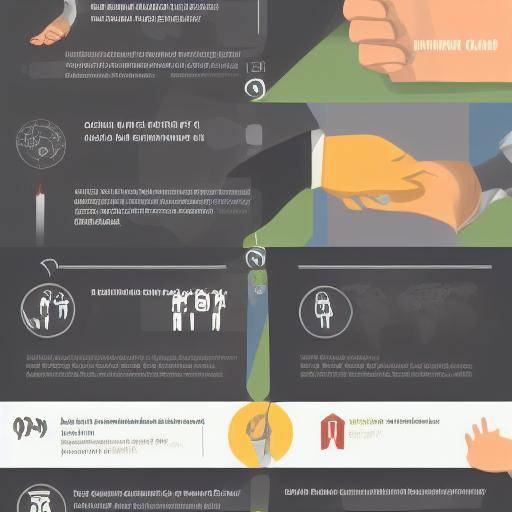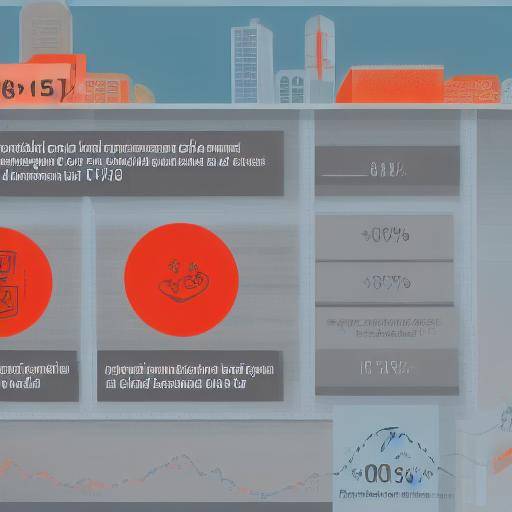
Global and local economic changes have always had a significant impact on the financial lives of individuals and families. Whether due to fluctuations in the labour market, changes in the cost of living or economic crisis, the need for an emergency fund becomes increasingly relevant. In this article, we will explore the necessary assessment, adaptation and planning to address these financial challenges. From history and context to future trends and predictions, this article will provide an integral view of the importance of having an emergency fund in times of economic change.
Introduction
Financial stability is an objective for many individuals and families, but economic changes can often affect this stability unforeseenly. In times of uncertainty, such as those experienced during economic crises or significant changes in the labour market, having an emergency fund can make the difference between financial survival and the crisis. In this article, we will explore how to assess the need for an emergency fund, adapt to economic changes and plan effectively for the financial future.
Assessment of the need for an emergency fund
History and Background
The notion of an emergency fund is rooted in traditional financial wisdom, which advocates the importance of reserving a financial mattress to deal with unforeseen situations. Throughout history, various cultures have had saving practices aimed at facing economic crises, natural disasters and health problems. These historical backgrounds show us that the assessment of the need for an emergency fund is a perennial concern for humanity.
In the modern context, the assessment of the need for an emergency fund has become even more crucial because of economic and labour volatility. Different historical moments, such as the 2008 recession or the global health crisis, have highlighted the importance of having financial reserves. Assessing the need for an emergency fund involves considering not only the current economic scenario, but also projecting possible events that may affect short- and long-term financial stability.
Analysis in Deep
Analysis to assess the need for an emergency fund should take into account income, monthly expenses, debts, investments and financial contingencies. In addition, it is crucial to consider factors such as the state of the labour market, the stability of the industry in which it works and the overall financial health. In quantitative terms, a risk assessment approach can be used to determine the optimal size of the emergency fund.
The need for an emergency fund should also be evaluated in qualitative terms, taking into account emotional and psychological aspects. Economic uncertainty can generate stress and anxiety, so the evaluation should contemplate the emotional impact of not having financial backing in times of crisis. The COVID-19 pandemic, for example, highlighted the importance of emotional stability that provides an emergency fund, even beyond its practical utility.
Comprehensive review
A thorough assessment of the need for an emergency fund will include specific considerations for different segments of the population. For example, self-employed workers can face unique challenges in assessing their need for an emergency fund, as their income flow can be irregular. Similarly, single parent families, older adults and young professionals will have different contexts that will influence their evaluation.
Adaptation to economic changes
History and Background
Adaptation to economic changes has been a constant throughout history. From the industrial revolution to economic recessions, individuals and communities have had to adjust to new economic scenarios. Adaptation strategies have been developed in response to events such as globalization, technological advances and financial crises, demonstrating the ability of people to cope with and adapt to economic adversities.
Analysis in Deep
Adaptation to economic changes implies the ability to adjust financial and labour strategies to maintain stability in an evolving environment. The COVID-19 pandemic, for example, generated significant changes in the way people work, spend and save. Those who were able to adapt quickly to the new economic reality were more likely to preserve their financial well-being.
Adaptation may also require acquiring new skills or seeking opportunities in emerging sectors or industries. Technology, sustainability and health are areas that have experienced significant growth in response to changing market demands, leading to job and business opportunities. Adaptation is not limited only to the labour sphere; it also implies adjustments in lifestyle and financial management to optimize resources in times of economic change.
Comprehensive review
In addressing adaptation to economic changes, it is essential to consider both individual and collective dimensions. At the personal level, adaptation may require re-evaluating financial targets, adjusting budgets and looking for ways to diversify income. At the community level, adaptation can involve collaborating with other members of society to strengthen support networks and develop creative solutions to economic challenges.
Effective adaptation not only focuses on individual resilience, but also prioritizes collective well-being. Participation in financial education programmes, support for local initiatives and the promotion of long-term economic stability policies are key aspects of comprehensive adaptation to economic changes.
Planning for the financial future
History and Background
Financial planning has a long history that goes back to the first forms of exchange and savings. Ancient civilizations already recognized the importance of preparing for the future through the accumulation of resources and assets. Over time, financial planning practices have been developed, incorporating investment strategies, risk management and property protection.
In the modern era, planning for the financial future has become increasingly complex due to the diversification of financial products, market fluctuations and growing longevity. People should consider not only wealth accumulation, but also effective asset management, retirement planning and protection against unforeseen contingency. The importance of financial planning is further emphasized in contexts of economic changes, where uncertainty can be intensified.
Analysis in Deep
Planning for the financial future involves assessing short-, medium- and long-term goals and developing strategies to achieve them. Asset diversification, debt management, smart investment and insurance acquisition are key aspects of financial planning in the context of economic changes. In the face of market volatility, proactive planning is required to consider adverse scenarios and potential opportunities.
In the personal domain, financial planning may involve the development of realistic budgets, the establishment of investment funds and the effective management of credit. At the business level, financial planning may require moderate expansion strategies, risk assessment and product portfolio diversification. Adaptability and flexibility are key in financial planning, allowing adjustments in response to unexpected changes in the economic environment.
Comprehensive review
Planning for the financial future should consider individual and family needs, as well as social and macroeconomic factors. Financial education, property protection, retirement and inheritance management are integral aspects of comprehensive financial planning. In addition, financial planning should also be assessed on the environmental and social impact of financial decisions, which means considering sustainable, ethical and socially responsible investments.
Conclusions and FAQs
Conclusions
The impact of economic changes on the need for an emergency fund is undeniable. Rigorous assessment, proactive adaptation and meticulous planning become essential elements for successful sailing in volatile economic environments. History has shown us that the ability to evaluate, adapt and plan has been key to financial survival and to thrive in times of uncertainty.
Ultimately, having an emergency fund, adapting to economic changes and planning for the financial future not only affects personal stability, but also contributes to the economic resilience of communities and society as a whole. By making informed and proactive financial decisions, people can face economic challenges with confidence and prepare for a more solid and secure future.
Frequently asked questions
How do I determine the right amount for my emergency fund?
The amount of an emergency fund will vary according to the personal situation, such as income, expenditure, debts and financial commitments. It is common to consider between 3 to 6 months of expenditure as a starting point, but individual and family factors will influence the final amount.
What strategies can I use to adapt to sudden economic changes?
Keeping a flexible budget, finding alternative sources of income, improving labor skills and maintaining a support network are effective strategies to adapt to sudden economic changes.
How can I plan for retirement in a volatile economic environment?
Retirement planning in a volatile economic environment requires a combination of investment diversification, periodic review of savings and contingency preparation plans. Consultation with a financial advisor can be beneficial to develop a solid strategy.
What is the importance of financial education in financial assessment and planning?
Financial education is critical to making informed decisions, avoiding unnecessary financial risks and developing sound savings and investment strategies. A strong understanding of financial principles is essential for effective financial assessment and planning.
How can I adapt my lifestyle to a challenging economic environment?
Adaptation to a challenging economic environment may involve adjusting budgets, reducing discretionary costs, seeking alternatives to costly services and maintaining a savings and efficiency mentality.
What is the influence of external factors, such as economic policy, evaluation and financial planning?
External factors, such as economic policy and regulatory changes, can have a significant impact on financial assessment and planning. Keeping informed about the overall economic landscape and assessing how external changes can affect the personal financial situation is crucial.
In conclusion, evaluation, adaptation and financial planning are key tools to navigate economic changes and ensure long-term financial stability. By employing effective strategies and making informed financial decisions, individuals and families can confidently face economic challenges, build a solid emergency fund and plan for a prosperous financial future.






















































